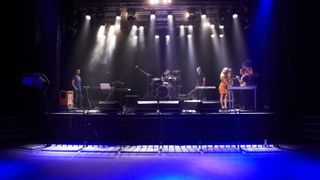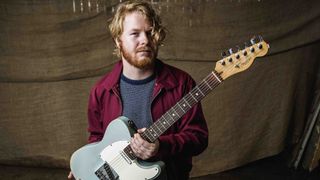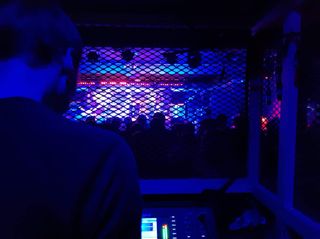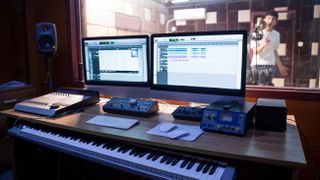
It's hard to imagine anyone right now who isn't being affected by COVID-19, but one of the UK's greatest exports is being hit incredibly hard. The music industry's fragility has been exposed in the lockdown that is keeping people away from venues. And it's specifically hurting those who are often working the hardest with the lowest returns; performers, venues and crew.
We spoke to a live sound engineer, recording studio owner, artist management and function band agent about how they and the artists they work with are weathering a crisis that could have huge implications for music.
Sam Drower is a self-employed sound engineer who works at music venues in Bristol including the Exchange and the Louisiana. He also plays bass in Lightning Sharks.
Vicky Langham is management co-ordinator at Northern Music Company who manage acts including Opeth, Paradise Lost, Katatonia, Devin Townsend and 65daysofstatic.
Del Cotton is Managing Director of Hireaband, a booking agent for function, wedding and tribute bands.
Tom Peters is a producer at tompetersproduction.com and runs Trapdoor Studios in Liverpool. He's also guitarist in Alpha Male Tea Party and drummer in GUG.

What are the immediate effects on the industry you're noticing so far in terms of your work and the situation you find yourself in?
Get the MusicRadar Newsletter
Want all the hottest music and gear news, reviews, deals, features and more, direct to your inbox? Sign up here.
Del Cotton: “I work in the covers band industry, my company, Hireaband.co.uk provides bands and entertainers for weddings, corporate events and private functions. Essentially, all activity has ground to a halt with the vast majority of events either being postponed or cancelled outright.”
"Essentially, all activity has ground to a halt"
Del Cotton
Vicky Langham: “We have a lot of cancellations, both tours and festivals requiring hours of rearranging at a very busy and uncertain time. Obviously, everyone else is clambering to do the same, and there’s a lot of fear right now about the future. We are having to tell crew they no longer have the next few months work they were counting on, which is very hard.
“On top of that I have two bands with albums coming out, and many of the promo activities, such as press trips and video promo filming is cancelled, not to mention the album release shows we had been planning. This means we need to adapt quickly and look at alternative ways to make this all work, it’s a lot of pressure.”
Sam Drower: The most recent development is that the UK Government has advised that people should not attend bars, clubs or pubs - But they've stopped short of outright banning mass gatherings or insisting that venues close down [the government has since closed bars, clubs and venues].
"Most venues will only be covered by their insurance in the event of an actual ban or forced closure, meaning that if they "voluntarily" choose to close their doors, they'll be ineligible for any form of compensation. This means that self-employed sound engineers like myself will lose all of their income and have no way of making money.”
“Prior to today, i'd say about 75% of my workload was cancelled [it's now 100% since Sam spoke to us]. Both in-house and touring work are now not possible due to the Covid-19 outbreak. I was due to go on a European tour in April and May as front of house engineer for a band, which has also been called off.
"However, the impact this has on me isn't anywhere close to the impact it has had on the band who have sadly been forced to cancel three tours of the US and Europe between March and May.”
Tom Peters: “Well, straight off the bat I've had a couple of big postponements and I know a number of my contemporaries are facing similar cancellations. I was due to be recording an album in April down in Bristol and then mixing it up at Trapdoor Studios (my place in Liverpool) but given the situation we're in, we've had no choice but to postpone.
“The difficulty now is it's almost impossible to say when I'll be able to start booking stuff back in again as the projected timeline for everything seems to have no endpoint.”
“Other than direct cancellations of work I already have booked in, the main issue now is how to go about continuing my work in the immediate future. The recording studio being as intimate an environment as it is, it doesn't really feel appropriate to be trying to continue with running sessions so I am trying to re-focus my energy towards things I can do on my own like mixing and mastering.
"A huge portion of my clients are either gigging musicians or work in hospitality roles that have been savagely hit by the social-distancing advice"
Tom Peters
“However, that hasn't been easy as I have had a lot of clients essentially pull-out of proposed work/unable to pay deposits or even cover existing invoices etc. because they have been affected really badly by the sudden shift in work and income.
“A huge portion of my clients are either gigging musicians or work in hospitality roles that have been savagely hit by the social-distancing advice so the income they might have used to master an album, mix a single or record anything has pretty much disappeared. So, whilst I theoretically could continue working throughout this on stuff I can do on my own, clients who have the spare income to potentially utilize those services have all but disappeared.”

For those who many not realise, just how reliant are many artists on touring now?
Vicky: “Live touring is a huge income stream for the bands since the sale of physical music slowed down. Many bands rely on that income to survive, and a lot of smaller bands stand to lose everything with all the cancellations.
"We have been somewhat lucky flights wise, as many companies are offering vouchers to use at a later date, but that doesn’t help our cash flow situation right now.”
Sam: “I think it is fair to say that touring is probably the main source of income for many artists these days - Particularly smaller independent ones who do everything themselves or with limited outside support.
"A lot of smaller bands essentially live on the road, with live performances, merchandise sales and audience building being a crucial part of how they sustain themselves.”

How damaging could this be? Can it be overstated?
Vicky: "I don’t think it can be overstated no. This will end many bands’ careers as they simply can’t afford the losses from tour expenses that were pre-booked before the cancellations.
"On top of that there are all the self-employed contractors, such as tour managers, sound engineers and techs who all stand to lose substantial income. If this carries on into summer festival time, many of them will suffer and may not have sufficient savings to cope. I think many people are going to be forced to find alternative work outside the industry as a result."
"The question now is how long can studios continue to run with no clients"
Tom Peters
Tom: “On an individual level, it could result in me having to close the studio but I'm trying to remain as positive as I possibly can and keep things ticking over - I'm confident I can get out on the right side of this but there's always the niggle in the back of the brain that things won't recover and I'll have to cut my losses and shut up shop. I'm pretty sure I'm not the only one feeling that way at the moment.
“Industry-wide isn't looking a whole lot better. With touring pretty much completely off the table, bands are losing their income streams and recording being what it is these days (ie a complete financial black-hole), it's likely to be hit very hard by what's going on.
"Don't get me wrong, I think bands and artists will always want to record but with their primary income streams completely capped off, it's unlikely they'll be booking into recording studios until things are looking brighter. The question now is how long can studios continue to run with no clients, treading water until it starts to improve; I think it's very likely we'll be losing a few iconic places over the next few months.”
"I'm worried that a lot of smaller bands will be unable to cope"
Sam Drower
Del: “It has the potential to be devastating. Many musicians earn their entire income from playing in bands. It supports many thousands of men and women all over the UK. These people are now faced with no income whatsoever for at least the next three months. If government guidelines continue as they are now, it will cause a huge amount of hardship to entertainers. Some may even leave the industry to find new jobs and many won’t return.”
Sam: “Depending on how long it goes on for, it could be very damaging. I'm worried that a lot of smaller bands will be unable to cope, and by the time we get back to a state of normality, they won't be in a financial position to resume touring. There's a lot of overheads to cover.”

Are the government's proposed plans to support businesses going to make a positive difference for you?
Del: “I hope so. To be fair, I don’t have many complaints about the way this is being handled at the moment. They’re doing what they can and the most recent offer of salary support could be a life saver as we too have a vastly reduced income.”
Tom: “This is where it (hopefully) gets more positive for me. I'm fortunate that the property my studio is in falls into the small business rates relief scheme. A good friend who runs Sort Rehearsals in Liverpool (a great facility for bands) gave me a call after I'd made a bit of a groveling appeal for work on social media to tell me I'm entitled to a grant which should help cover my basic bottom line throughout this. It wasn't something I was aware of but I'm told that that will start coming into force in early April so I should be getting a letter from Liverpool Council in the next week or so.
“A lot of other larger places won't be entitled to that so it's hard to know how those facilities are going to be able to manage if this continues for the foreseeable.”
Vicky, are any of the artists you work with looking into the possibilities of online performances or other alternatives to traditional live shows that fans can support?
Vicky: “Strangely that was something I was discussing with two acts this morning. For one we are looking at streaming a live show purely for promotional reasons. For another we are considering it as both something for the fans, and also as an additional income stream while they are in lockdown and can’t play live.”
“We also had a band start a crowdfunding campaign yesterday, and already in 24hrs it’s doing really well. It’s clear fans care and want to help in any way they can.”

What else can people do to help?
Vicky: “Right now, we are asking fans to visit the bands' official stores and support us by buying merch so the band are earning in this difficult time. We’d also ask them to be patient, we are trying to reschedule most shows where possible, and it would be great if they could buy a ticket to those too.”
"We are asking fans to visit the bands' official stores and support us by buying merch so the band are earning in this difficult time"
Vicky Langham
Sam: “Is there an album you've been streaming a lot lately? Pick up a physical copy or buy a digital download. Track down the online Merch store that will give artists the bigger cut - Usually that's Bandcamp, HelloMerch or something similar.
"I know HelloMerch in particular have done a deal with the american label Sargent House that allows customers to pay above the asking price for certain items, with all extra money going direct to the artist themselves.
"It's also a good idea to keep hold of any concert tickets, and waiting for the rescheduled events rather than going for a refund. And one of the best things you can do is to keep a positive mental attitude. Tell your friends about your favourite small band and send them a nice email/tweet/facebook message.
"Also, various small venues are going to struggle. I'd like to point out that The Exchange in Bristol is a community owned venue and they've just opened up membership applications again, meaning anyone can own a share in one of Bristol's most exciting venues. Contact your local small music venues and see what you can do for them - It's going to be a difficult few months for all involved."

Del: “The best thing they can do is book acts for future dates. That way the bands will have a reason to hold on. There’s nothing warms the heart of a gigging musician better than a full diary, so don’t wait till nearer your date, book now.
"There’s a practical reason for doing this too; so many dates are being rescheduled that availability is already very tight. Bands are adding this year’s gigs to next year’s diary. So don’t hesitate. The best bands are incredibly busy so if you want to ensure a great event, get in touch and book now.”
Tom: “At the moment, I'd say a lot of people are going to be shifting towards remote work. Mastering and mix work are going to be the easiest things to facilitate whilst maintaining social distancing and lockdowns. If you have any recordings you want to get mixed or mastered and you've got the spare income to do so, get in touch with your favourite mix/mastering engineer and show them some love.
“I'm also trying to incentivise booking sessions in for when things relax a bit more by offering reductions in deposits. I've had a long-standing client of mine pre-pay for some session time which we plan to pick-up once all this is over which is also fantastic so I know there is very much a willingness to support studios.
“Importantly for me, I'm not looking for handouts - I want to continue to provide a valuable service to musicians and creative artists everywhere so even if you aren't wanting to book in right now, consider setting up a 'tab' for future work so studios can make it through the rest of the year and come out the other side, ready to make some bangers.”
"I think several businesses may go under as a result of both cancellations"
Vicky Langham
Do you think we could see the loss of some venues from this?
Vicky: “Potentially yes, I think several businesses may go under as a result of both cancellations and people being advised to avoid crowds etc. Even when the advised isolation period ends, people may be reluctant to go out, and it could take time to get going again.
“I think the not knowing how long this will last is the hardest part, we can’t plan clearly with any conviction as things are moving rapidly day to day. We just have to adapt and react as fast as we can.”

Rob is the Reviews Editor for GuitarWorld.com and MusicRadar guitars, so spends most of his waking hours (and beyond) thinking about and trying the latest gear while making sure our reviews team is giving you thorough and honest tests of it. He's worked for guitar mags and sites as a writer and editor for nearly 20 years but still winces at the thought of restringing anything with a Floyd Rose.










